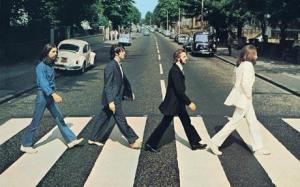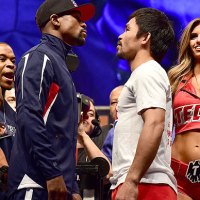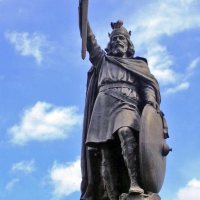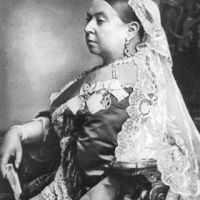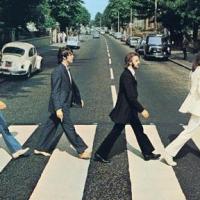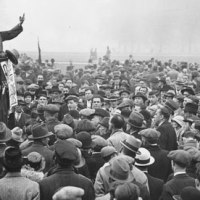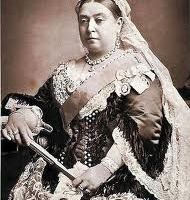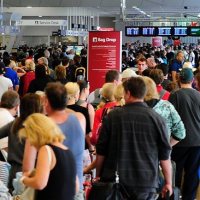Alfred…A Great Guy!
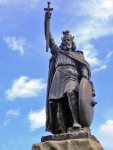 In 1899 the Victorians marked the 1000th anniversary of the death of Alfred the Great as the founder of England and saviour of its Christian faith.
In 1899 the Victorians marked the 1000th anniversary of the death of Alfred the Great as the founder of England and saviour of its Christian faith.
In the BBC Millennium Poll of 2000, Alfred didn’t make it into the top ten list of greatest Britons.
Sometime during those one hundred years the British lost favour with her most revered son.
Alfred wasn’t called “great” for nothing. He is the only British king with the title.
So what happened between then and now to change our views, or if not change them, merely ignore his achievements? Perhaps it’s just too long ago?
Alfred did however make it into the top 100, along with such luminaries as David Beckham, Tony Blair, Robbie Williams and even Boy George.
I’ll pause at this point to allow you a gasp of astonishment…..
Some sense prevailed in the top ten. Winston Churchill came out at number one, followed by Isambard Kingdom Brunel, Princess Diana, Charles Darwin, William Shakespeare, Isaac Newton, Elizabeth I, John Lennon, Horatio Nelson and, in 10th place, Oliver Cromwell.
Bearing in mind that the poll was conducted 16 years ago, it’s possible that the nation had an unhealthy dose of celebrity worship and collective amnesia.
It was only three years after the death of Diana; the country was still euphoric basking in the afterglow of a new labour victory, and the nation had yet to be embroiled in the war on terror.
Although Tony Blair didn’t make it into the top ten he did make it into the top 100. If the poll was taken today, it’s highly unlikely he (and many others) would get a look in. The highest ranked living person at the time was Margaret Thatcher, coming in at #16.
60 of the top 100 were alive during the 20th century. Hence the poll was severely flawed for it was indicative of contemporary individuals and populist history. Surely Alfred was greater than John Lennon? Indeed he was, but he died in the 9th century, and not the 20th; nor was he a famous singer/songwriter. Imagine that!
Twelve years after the poll, both Churchill and Brunel played prominent roles in the opening ceremony at the London 2012 Olympics, and both coincidently topped the millennium poll of 2000, so perhaps there is some justice attached to it.
Back to Alfred the Great (those of you who have lost interest may leave now). Herewith follows a compact history lesson from a Bardy view:
When the Roman’s left Britain in AD 410, over 300 years of relative peace, stability and prosperity left along with them.
Her empire was under attack, Rome was in trouble and the legions needed to consolidate and attempt to fend off the vandals and barbarian hoards. For Britain, what followed was a period of substantial unrest, and is known today as the Dark Ages. It lasted for several hundred years, and England as we know it today did not exist. It became a place divided and ruled by feudal chiefs with a hotchpotch of kingdoms, the most powerful being Northumbria, Mercia, East Anglia and Wessex.
Wessex was the most powerful, and during the rules of Egbert (802-839) and Aethelwulf (839-858) it expanded to include most of the land south of the River Thames, although not the Mercian controlled area of London. It was
during these periods that England was under constant raiding parties from the Vikings and Norsemen of Scandinavia.
In 865 the Vikings landed with force and within ten years subjugated the kingdoms of Northumbria, East Anglia and Mercia. Wessex was the next in line.By this time Alfred’s elder brother Ethelred was King of Wessex, and together they confronted the invasion of Wessex in 871. But they failed to prevent the advance and during the battle Ethelred was killed. Wessex was the last surviving Anglo-Saxon domain, and if it fell, then the land would be completely ruled by the Vikings.
Alfred took the throne, and through bravery and intelligence, through methods of tactics and guerrilla warfare, eventually prevailed.
He became an honourable and wise king, uniting the kingdoms, constructing the country’s first navy, instigating law and order, and promoting education, with particular emphasis on the English language, art, culture, and successfully creating – out of the Anglo-Saxon diaspora – the nation of England.
That’s why he is known as Alfred the Great.
Perhaps if a new poll is taken, he can take his rightful place along with Churchill, Elizabeth I, and Nelson as one of the nation’s top ten greatest Britons.
Chewing the Cud over GMT and BST…..
 Very soon I will give the hour back which I received 5 months ago. In seven months time I shall reclaim it.
Very soon I will give the hour back which I received 5 months ago. In seven months time I shall reclaim it.
I don’t know who is the beneficiary of my sixty minutes, nor do I know who returns it.
I do know that every year since the day I was born I have, with great philanthropy, parted with an essential essence of my life – my time – but comforted in the knowledge that I only permitted it’s borrowing on a short term loan.
I gave it free, without interest, yet if time was indeed money, I could have become very wealthy over the years had I charged for it.
After all, if I asked my bank manager for a loan he wouldn’t give it to me for free just because I promised to return it promptly after seven months. The difference of course is that my time is priceless, and although it is unique it has no monetary value.
I can invest it, I can spend it, I can save it and I can waste it. I cannot hold it. I cannot keep it. I cannot preserve it. It is gone in a moment – and lost in a memory.
I can think of nothing more valuable, more essential than time, yet it is not oil, not gold, not silver, not platinum. My time is more precious than metals and minerals, but it is all mine – every single second of it. It’s value is incalculable.
At 02.00 on the last Sunday of March (as is always the case) I will say hello to British Summer Time, or on the last Sunday of October, return to the dark days of Greenwich Mean Time.
It’s an economic decision that I have no choice over. A few years ago the UK government considered the Daylight Savings Private Members Bill to abolish GMT and align the British Isles with CET (Central European Time), which would have meant more light at night and less light at morning. Longer summer evenings, and maybe an hour more light in winter resulting in longer darker mornings. It would have suited the more southern English, but not the northern Brits. In any event, the bill was rejected, and it’s not likely to reappear again for some time.
Any change in daylight saving policy won’t change the orbit of the earth, no more than it will stop the sun from rising and setting at inconvenient times for commerce and industry.
The cows in the fields will chew the cud regardless. The sheep will be fairly laid back and the pigs are unlikely to grunt in dissent. The cocks will continue to crow at dawn, and the chickens will lay their eggs without cracking up at the stupidity of it all.
The EU will be happy because everything will be standardised. But they tried that with the Euro and look what happened.
They can mess around with money. Surely we can’t allow them to mess around with the clocks as well?
I just don’t have the time for it.
It’s so bad it’s good….
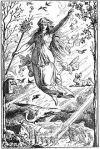 What’s “Good” about Good Friday?
What’s “Good” about Good Friday?
After all, it signifies a man abused and tortured, made to carry his own cross to be crucified, had nails hammered into his hands, a crown of thorns embedded in his head, and given vinegar to drink when he asked for water. It was clearly a very bad day.
“Good Friday”, possibly the most sacred day in the Christian calendar, appears to have been diminished by our secular and consumer led society. It’s certainly a good Friday for the new deities of consumerism – for the shopping malls and superstores, whose temples are open for worshippers. It’s a good day for atheists and agnostics, because they get a public holiday regardless of their beliefs.
Nobody really knows why the day of Christ’s crucifixion is called Good Friday. Indeed, there is no evidence that it actually happened on a Friday. It was a convenient date which married the early Christians to Pagan beliefs back in the post-Romano era.
There are two modes of thought: Good Friday was originally God’s Friday. This would make sense, because as time went by words change and develop. The Catholic Church is fairly open to this suggestion. Unlike Evangelical Bible-Thumpers who argue that it was “Good” because Christ gave his life on the Cross to save our souls. For all his suffering, it was filled with goodness they proclaim. Pre and post Romano Britain, Anglo Saxon, and medieval man would not have considered that, and certainly not the Benedictine monks who ruled with ecclesiastical hammers. Suffering and penitence was the order of the day – there was nothing to be happy about! “Christ suffered and so should you” they said. What’s good about that?
Meanwhile in Spanish Dominions, the Dominican monks ruled, and they would have dictated, absolutely, their expectations and rules, and were directly linked to the seat of the Spanish throne. The Dominicans (the religious quasi political branch of the Spanish Empire) were ruthless in their endeavours.
So what’s all this got to do with Good Friday? The simple answer is politics. Jesus didn’t choose Friday to die, nor did he choose Sunday to resurrect. Why? Because 2000 years ago the calender as we know it didn’t exist! Time revolved around the equinox. Rome and future Popes created the calendar – from the Julian to the Gregorian, and it was expedient for a Pope to embrace pagan celebrations aligned with Eostra – the pagan god of rebirth.
Emperor Constantine (the first Pope of Power) was a very clever chap. In order to unite his empire he knew he had to embrace all and alienate none. The dates of Easter has no more credence than the 25th December – the date of Christ’s birth. Christian’s do not question the date – it’s the event that matters.
Constantine needed a reference point: that which was before, and that which came after – Before Christ, and After Christ. BC and AD.
My analysis isn’t an academic study, it’s merely an observation. Yet there is little doubt that significant Christian dates were aligned with Pagan celebrations – it was expedient and convenient. Which brings us to Ostara, or Ēostre the pagan Goddess of Dawn and Rebirth. Note the word Goddess. Christianity gave us one god – God – yet here was a goddess worshipped in pre-Christian times, and she became associated with “Easter”. How is that? Easter is the association and celebration of Christ’s crucifixion and resurrection, yet, prudently Constantine combined the two. It was Constantine who brought the papacy to power, and effectively established the Catholic Church.
Does all this matter? Do dates matter? Does it matter that we have Easter eggs (another pre-Christian symbol of fertility and rebirth and don’t forget rabbits – we all know their proliferate skills). How many people actually think about that?
All that matters really is what Easter signifies – the persecution, betrayal, crucifixion and resurrection of one man who changed the world. We celebrate His birth at Christmas, lament his Death, and take joy in his Resurrection at Easter.
You may not believe it – but that doesn’t mean you can disprove it! Maybe that’s why it’s a “Good” Friday.
The Baby Boomers…….
If you were born between 1946 and 1964 then you are officially a “baby boomer”.
You’re as old as 73 and as young as 55 – assuming you’re reading this in 2019.
Baby Boomer is the term used for the generation born during the 18 years after WWII, which by all accounts changed the world and has become responsible for all the ills of society.
The first batch of boomers heralded the age of the teenager and the swinging sixties. A sixteen year old born in 1946 would have sailed through the austere 1950’s, would have abandoned Bill Hailey and the Comets, Frank Sinatra and the balladeer crooners, rejected their parents hand-me-downs, and embraced 1962 with pop music and liberation. Cliff Richard and the Shadows were the face of the young and around the corner loomed the Beatles and the Rolling Stones. Even Elvis was getting old hat.
Their parents by contrast were the generation which suffered in the depressing thirties, and then went off to war.
Indeed their parents before them would have gone through the First World War, and they certainly would have had no concept of being a teenager – they would have left school at 12 or 14 and then went to work – there was no room for anything else.
By 1966 our hero or heroine – the subject of this post and first born boomer – would be 20 years old, fashion conscious, sexually liberated, rocking to Mick Jagger or rebelling along with Bob Dylan. Later he or she would have a good job, money in the pocket, and an access to university long denied from the forebears.
Their peers would have their minds and horizons broadened and take to the streets to protest about the Vietnam war, join CND and march to “Ban the Bomb”. They were the “have it all” generation. If they didn’t get great jobs, they would still get good jobs – jobs which they could secure for 35 years and retire comfortably.
Such was their opportunity; they bought houses, raised families, and became more affluent than any generation gone before. They went through a period of relative peace (in the UK at least), did not fight any wars, and were not conscripted for national service, and even the threat of nuclear Armageddon and cold war politics fazed them not.
Our twenty-year old pot-smoking hippy (who danced at Woodstock), became either a bog-standard pillar of the establishment or found his way into the echelons of society – and if he didn’t become a captain of industry he took a seat in Parliament responsible for the very society he had fun to reject.
The mantra of Roger Daltry and the Who – Hope I die before I get old – was just a juvenile distraction.
Our first baby boomer has retired now. He has even escaped the austerity cuts and his pension is secure. His life was one of incredible social change and privilege which saw a National Health Service, a welfare state, security, peace and financial wealth.
But is he happy? He has seen the erosion of values, the erosion of community, the destruction of the nuclear family – all factors which held his parents and grandparents together.
Our 1960’s teenage angry young man now complains about the lack of values, waxes lyrically with nostalgia and regrets sentimentally about his parents generation – moans about the state of the nation, deplores the loss of standards, and castigates the young with their disrespect and irreverence for authority.
He wants to bring back hanging and flogging, he wants to incarcerate them, he wants to punish them with the full force of the law.
In 1966 he didn’t want to know about 1945 – he didn’t want to know about the hardships his parents suffered. What he wanted was a comfortable life.
Well he got it – so the best thing he can do now is stop being a hypocrite, and stop bloody moaning.
The Beatles, the Philippines and President Marcos….
Fifty three years ago the Philippines fell out of love with the Fab Four. It was also the year that John Lennon made two comments, one which was to be his eventual downfall.
In July 1966 the Beatles toured the Philippines. Little did they know that the dictator President Marcos and his wife Imelda were accustomed to (and expected) absolute attention and devotion; and they certainly didn’t take kindly to the fact that the Beatles refused an invitation to attend a breakfast reception at the Presidential Palace.
Their manager Brian Epstein politely declined the invitation on the grounds that it was the group’s policy not to accept official invitations. Marcos took this as a personal snub and consequently revealed this perceived insult to the media, who ran with it, implying that it was also a snub to the Filipino people.
Subsequently all police protection was removed from them. The group and their entourage had to reach Manila airport unguarded. Their road manager Mal Evans was assaulted, and the band encountered a hostile crowd.
Although they managed to board the plane, Evans was removed, and Epstein was forced to hand over all their Philippines earnings before they were permitted to leave the country.
It led to John Lennon remarking that should he ever return to the country, he “would fly over it with an H-Bomb”. Many biographies about the Beatles have suggested that they were all lucky to escape with their lives, such was the hostility which they encountered once Marcos stated that his people had been scorned.
Of course we can argue now that perhaps the Beatles were not familiar with international diplomacy, but they relied on their manager to manage, and the manager made a decision. Yet the times were different. Marcos was all powerful, and this unwitting act of disrespect to refuse an invitation to the palace was deemed a personal insult to the president who through hubris was so offended, that he manipulated his people to turn against the Beatles. His insult was an insult to his people. It’s a classic example of one man exercising power for his own ends. Indeed, this event is not so much about the Beatles, but about pride, power, and dictatorship. It’s about a despot who assumed that his power was omnipotent.
It would be another twenty years before Filipinos finally realised that this was power absolute and had the courage to rise up in 1986 with “People Power”.
When John Lennon said he would like to fly over the Philippines with an H Bomb he was 25 years old and did not make that remark directed at the Filipino people. But it wouldn’t be the first hot-headed thing he said, because earlier he said something else which would eventually cause him even more controversy and years later – his murder.
Three months earlier in March, he was reported in the London Evening Standard, during a fairly innocuous interview as stating that the Beatles were more popular than Jesus. It was an off-the-cuff innocent and careless remark and typical banter from a young Liverpudlian. This was picked up by right-wing religious conservatives in the USA, and exploited. It further fuelled the anger in the Catholic dominated Philippines, which even today they wrongly regard as the blue touch paper which set the firework off.
Through clever propaganda, instigated by President Ferdinand Marcos, the Filipino people, over half a century later, believe that their antagonism to the Beatles was because of Lennon’s Jesus statement. It could not be further from the truth.
The story had no merit until a US teen magazine naively ran with it on their front cover, resulting in an evangelic radio station WAQY in Birmingham Alabama announcing that it wouldn’t play anymore Beatles music and that they were going to burn their records. This led to a domino effect, and other radio stations followed suit.
The English brushed off his comments in the newspaper at the time. It wasn’t news. Not a single word of complaint came from the Church of England or the Roman Catholic Church.
In August when the situation had reached a rolling-stone momentum which threatened the existence of the group, John Lennon was forced to apologise twice – stating that he was not boasting about the fame of the Beatles, and he never intended to cause offence to people of religious faith. It happened in Chicago and proved to be the last Beatles tour.
So let’s put the record straight – here and now! The Filipino people didn’t get angry with the Beatles because of what John Lennon said. They were manipulated and encouraged by a state-run media, controlled by a demigod dictator, who was snubbed by the biggest band of the age. Marcos was insulted, and it struck at his pride. Such was his bitterness that he ensured that his countrymen would feel the same pain and humiliation.
Marcos controlled the media, the military and the government and therefore he controlled the minds of the people. It is he and his cronies that the Filipino people should be angry with – not the Beatles.
Today, the Beatles are revered in the Philippines and there isn’t one karaoke bar which is not playing a Beatles song and not one Filipino crooner who doesn’t attempt to sing one.
As Paul McCartney has acknowledged – it wasn’t the people, but the regime that caused the problems, and he’s proud in hindsight that it was the Beatles which first snubbed the Marcos family and dented their crown.
The Crimea…Half a League Onward…….
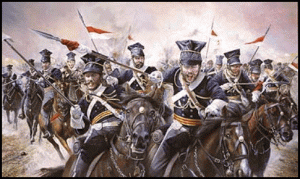
Half a league, half a league,
Half a league onward,
All in the valley of Death
Rode the six hundred.
‘Forward the Light Brigade!
Charge for the guns!’ he said:
Into the valley of Death
Rode the six hundred.
Just over a hundred years ago the world went to war, and the stage for it was set by another smaller but no more less significant conflict almost 60 years earlier. It’s a timely reminder – because it was called the Crimean War.
It was a war which altered the balance of power in Europe, and which subsequently led to the assassination in 1914 of Archduke Ferdinand – heir presumptive to the Austro-Hungarian throne. His killer was Gavrilo Princip a Serbian nationalist who wanted the South Serb provinces to break away and be combined into Greater Serbia – or a Yugoslavia – a union of South Slavic countries.
This ultimately led to other European states being dragged in, all vying for their position and alliances, and so it was that the Great War began. This brief introduction, deliberately short on studious analysis is merely to put the Crimean War into context. And we must go even further back from it’s origins to understand how and why the Crimean War began – as far back as the Napoleonic Wars 200 years ago.
2014 commemorated the 100th anniversary of the start of World War One, but last year 2015 also commemorated the 200th anniversary of the Battle of Waterloo and the end of Bonaparte’s dream of a European empire, with he as her emperor.
At the end of the Napoleonic war the great powers Britain, Russia, Prussia, Austria and France got together in Vienna to try and restore European stability by suppressing revolutionary republics and supporting sensible monarchies. Known as the Treaty of Vienna, it led to 30 years of peace in Europe. By 1845 this peace was showing signs of cracks, principally because of the weakness of the Ottoman-Turkish empire.
Then as now Turkey had one foot in Europe and the other in Asia, or more to the point one foot in European Christian orthodoxy and the other in Islamic Middle East. At this point enters the protagonist, then as now – Russia.
Tsar Nicholas was keen to take advantage of the weakness of the Ottoman Empire with a view to carve up the European part of Turkey and gain some valuable strategic areas. This effectively would give Russia control of the Dardanelles, the strait which connects the Black Sea to the Aegean, and more famously known today for the disastrous tragic WWI campaign of Gallipoli.
Due to increased Russian aggression, Turkey declared war against Russia in October 1853. A month later the Russian Black Sea fleet destroyed a Turkish squadron at Sinope, a Turkish city on the Black Sea, which galvanised British concerns because it threatened her trade links with Turkey and India.
The French, who had no particular interest in Turkey, chose to ally themselves to Britain because they were still smarting from their defeat by Russia in 1812 (later immortalised in Tolstoy’s “War and Peace” and Tchaikovsky’s 1812 Overture) and thought that this was their chance to return the bloodied nose.
An ultimatum was issued to Russia to evacuate from the area by March 1854. That month was significant because by then the Baltic ice fields would break up allowing the British to annihilate the Russian fleet should the demand be ignored, which it was. By August the combined Anglo-French fleet took control of the Baltic. Austria subsequently joined the alliance and together contributed to an army of 60,000 to defend Istanbul.
The Russian Tsar ignored the threats (shades of Putin here) and called the bluff. A British plan was formulated to land in the Crimea, and attack Sevastopol with the view of destroying the Russian fleet and the dockyard. What followed was a catalogue of indecision, chess board manoeuvring and glorified Victorian valour which resulted in the Battle of Balaclava and the Charge of the Light Brigade. This astonishing display of bravery, courage (madness some will say) into the “valley of death” as Tennyson penned it, so shocked and frightened the Russians that they never again dared to face the British in the field.
Eventually there was a victory of sorts, and the Russians accepted defeat, the demilitarisation of the Black Sea, and for a time the European settlement of the “Turkish Question”. With the 1856 Treaty of Paris, (as with all face-saving treaties of this kind) Russia went home to lick her wounds with a modicum of compensation.
That’s what it’s all about and that’s why the defeated always walk away with a prize of sorts. Political expediency, diplomacy and conciliation make the world go around, regardless of the pain and suffering to get there in the first place. It’s easy to start something, but damned difficult to end something. A lesson we never seem to learn.
Today Russia is on the aggressive ascendancy, and Turkey seeks a political route to European Union membership through clever compromise and negotiation regarding the current mass refugees crisis. History may be the past, but it is also the present and the future, and we ignore it at our peril.
See also Bardiness: Florence Nightingale
Related articles
Dodo
 The Dodo, an ungainly flightless bird, is extinct. “As dead as a dodo” is a phrase synonymous with finality. Yet in truth it also represents mankind’s ignorance, exploitation, and failure to recognise natural and delicate balances of ecology and habitat.
The Dodo, an ungainly flightless bird, is extinct. “As dead as a dodo” is a phrase synonymous with finality. Yet in truth it also represents mankind’s ignorance, exploitation, and failure to recognise natural and delicate balances of ecology and habitat.
Today we can frown upon those early seafarers who during the course of trade and exploration systematically devastated indigenous wildlife on their travels. The Dodo was just one of many creatures which provided easy meat. Just as the giant tortoises of the Galapagos Islands fell easy prey to hungry jack-tar and matelote – the rough sailors who had suffered long sea journeys with maggot ridden food, and succumbed easily to sickness.
Charles Darwin surmised, through his theory of evolution and natural selection, that species will invariably lose their original design if no predators exist to threaten them.
Hence why does a bird need wings if it doesn’t need to fly? All creatures, having evolved over millions of years, will adapt to their surroundings. If the Dodo felt threatened in its environment, it would not have lost its wings.
The Dodo, endemic to the island of Mauritius in the Indian Ocean, was a bird over three feet tall, and nested on the ground, which is indicative of it’s perceived security. It would never know that a ruthless predator would pounce one day. These predators came as passing seafarers and found easy pickings. Sailors tell tales, and the news of their experiences would soon spread.
Early explorers and colonists would not have considered the long term environmental impact of their enterprise. Nor would they have seen that introducing domesticated animals like cats and pigs to their new found land would have such a detrimental impact.
The Dodo, having never encountered a cat before, would be at a loss to defend itself. Having no wings was a significant drawback. Similarly, livestock required land, and as harmless as a pig may appear, they were much more dominant in foraging than the humble dodo which survived on fruit and lived in harmony with the tambalacoque tree.
Together with rats which were always unwelcome stowaways, and the deforestation of land to clear areas for human habitation, the Dodo’s peaceful and harmless existence was severely under threat.
Maritime exploration is laced with stories about sightings of strange creatures on land or at sea. The dodo was first sighted during the mid 17th Century in Mauritius by Dutch sailors. Back then conservation and protection would have been as remote a concept as satellite navigation.
Whilst modern man may wring his hands and lament about the extinction of a species, everything must be viewed in the historical context of the times. The dodo is dead, but not forgotten. It’s a permanent reminder – a symbol – that man is the custodian of Earth’s flora and fauna. This is the legacy of the Dodo.
The New Queen of Scots………
 Nicola Sturgeon, leader of the Scottish Nationalists, launched her party’s manifesto today. She says that another referendum of Scottish Independence is not on the agenda (yet) and she is committed to the abolition of Trident – the UK’s nuclear submarine defence system (or at the very least getting it out of her country). She’s also committed to the total impotence of the Conservative Party. Their march to power is real.
Nicola Sturgeon, leader of the Scottish Nationalists, launched her party’s manifesto today. She says that another referendum of Scottish Independence is not on the agenda (yet) and she is committed to the abolition of Trident – the UK’s nuclear submarine defence system (or at the very least getting it out of her country). She’s also committed to the total impotence of the Conservative Party. Their march to power is real.
The population of Scotland is less than 5.5million with 4.2 million eligible voters. 100,000 of which are recent due to the voting age being lowered to 16. It wasn’t enough to get them success last year in the referendum, but it’s still a significant number.
No one in England and Wales are allowed to vote for the SNP, yet they could well hold the balance of power in a hung Parliament after May 7th. There are 42 million eligible voters in England and Wales, so how is it that this small country, with a small party, can influence the affairs of everyone else – all of whom cannot vote SNP even if they wanted to!
The Scots think big, and they are passionatly proud of their identity, but what right do they have to have a say over the rest of us? This is not democracy in action. But it is a perfect storm whereby the established parties have failed the public miserably, and people just don’t trust them anymore, and will cast their vote for others – such as UKIP, or the Green Party, and of course the LibDems.
The nation is in flux. Cameron and Miliband are failing to engage, and neither Conservative or Labour can barely be separated with a blade of grass.
Indeed neither of them have the qualities of statesmanship which deep down is what the British public seek.
I really do fear that our parliamentary democracy, the oldest in the world – the Mother of Parliaments – is under serious threat. For indeed, a Government must be formed within thirteen days of an election – appointed by the Queen, and she certainly doesn’t know what to expect, or who she will be dealing with, and no doubt this is focusing her mind.
She surely never had to deal with anything like this throughout her long reign, especially potentially dealing with a party (SNP) whose fundamental goal is to break the very union she represents!
We must be very grateful that we have a constitutional monarchy, with a woman of substance as it’s head, because if the shit hits the fan, we can at least rally around the Crown – and thank God that she – Elizabeth – is the one wearing it!
Furthermore, what’s the difference between UKIP and the SNP? UKIP wants to maintain the United Kingdom, keep Trident, but leave the European Union. The SNP wants to break up the United Kingdom, abolish Trident, and join a greater European Union. Do the Scots really want that? It’s a potentially disastrous scenario, and the crazy thing is the English, Welsh and Northern Irish haven’t got a single solitary say in the matter. Maybe it’s time they did!
In God We Trust
 All American Presidents and candidates believe that God is on their side. The latest being Rand Paul, who says “with God’s help” he will win. That’s in sharp contrast with the UK candidates for Prime Minister. The Labour leader Ed Milliband has gone on record as being an atheist, although he does have faith (whatever that means).
All American Presidents and candidates believe that God is on their side. The latest being Rand Paul, who says “with God’s help” he will win. That’s in sharp contrast with the UK candidates for Prime Minister. The Labour leader Ed Milliband has gone on record as being an atheist, although he does have faith (whatever that means).
The Liberal Democrat leader Nick Clegg is also an atheist (but raises his son in his wife’s Catholic faith).
The Conservative leader David Cameron admits that he is a lapsed Christian, as indeed is the UKIP leader Nigel Farage (yet both proclaim that they have not lost their faith – deep down they have Christian values etc. blah blah).
This is a quandary.
I’m a Christian in so far that I believe in Jesus Christ. Any man who suffered as much as He, through persecution, betrayal and crucifixion, yet still decided to return within 48 hours to save those who treated Him so badly surely gets my vote. That’s dedication! Jews of course don’t believe that Jesus was the Messiah – he didn’t meet the conditions laid down in the Messianic Hebrew Chronicles – but they accept he may have been a prophet. The Messiah has yet to come – apparently.
Still, we have reached a tolerable medium, and Judeo-Christianity are the scales which balance precariously on the fulcrum of faith.
So how does that leave us in this secular western world? Well, the United Kingdom is a Christian country. Not my words – but the Queen’s. She is officially “Defender of the Faith and Supreme Governor of the Church of England”. She appoints Archbishops and bishops on the advice of the Prime Minister – the “Head of Her Majesty’s Government”.
This puts me, and Her Majesty in a pickle, although it’s more of a pickle for her (I’m just pickled). It beggars the question – how can an atheist Prime Minister advise “The Supreme Governor of the Church of England” on who should be appointed as the Archbishop of Canterbury – the symbolic head of the worldwide Anglican Communion? How can a Prime Minister of a Christian country in which the laws since Magna Carta were founded on Christian theology, if not exegesis, espouse from his or her political pulpit the importance of Christian values and Christian morals? How can a Prime Minister be a PM without practising what he preaches?
Love it or loath it, the United Kingdom is predominantly a Christian country. Other religions and faiths function very well within it. They are welcome. Britain is traditionally the home for all – and it’s a worthy commendation. Yet, with a constitutional monarchy, with a Queen as the Head of State, not only in the UK but in other Commonwealth countries around the world, one would expect her Prime Minister to have a Christian faith. It is the bedrock of over 1500 years of British history, and one way or another it has stood the test of time, at home or abroad.
In the USA candidates who declare themselves as atheists wouldn’t stand a chance. “In God we Trust” is written on every dollar bill, and if God was never mentioned in the Constitution He was certainly present between the lines.
So here is my problem. Who do I vote for? An atheist or a Christian? Should it matter? After all, the future of the nation isn’t at stake, what’s at stake is our humanity to our fellow man and how we care for each other.
What’s God got to do with that? I think you know my answer!
